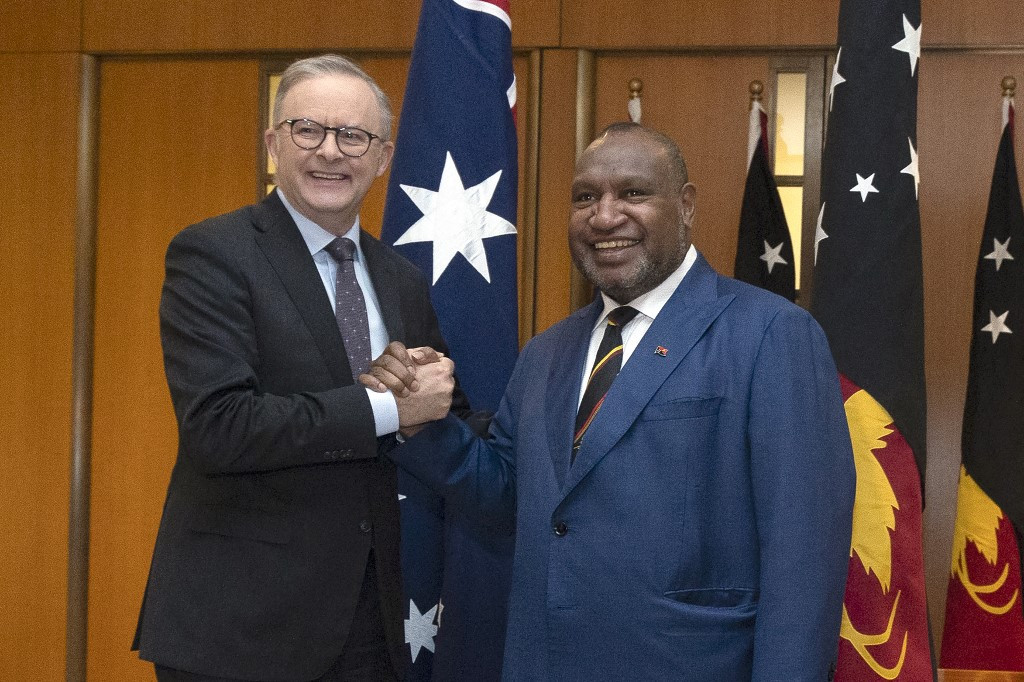Popular Reads
Top Results
Can't find what you're looking for?
View all search resultsPopular Reads
Top Results
Can't find what you're looking for?
View all search resultsAustralia punts on cash-for-favors in Pacific to squeeze out China
In the past, agreements giving one nation temporary control over another’s sovereignty have usually been part of the decolonization process and are not entered into lightly by independent states.
Change text size
Gift Premium Articles
to Anyone
I
t’s the giving season and Australia has been exchanging hard cash for favors with Papua New Guinea (PNG) and Nauru, giving it an increased role in their sovereign decision-making. A lack of clarity as to how these arrangements can be enforced raises questions of just how “secure” they really are.
Australia’s role as a colonial power in the region may not be as well-known as that of other countries. However, both Nauru and PNG gained their independence from Australia in 1968 and 1975 respectively. The bilateral relationships are well established, multi-faceted and have at times been fractious.
In the past, agreements giving one nation temporary control over another’s sovereignty have usually been part of the decolonization process and are not entered into lightly by independent states.
Long on PNG’s wish list has been for a team to join the Australian National Rugby League competition. That has finally been granted with Australian taxpayers funding a geo-strategic play, worth US$400 million over ten years, that will see Australia’s nearest neighbor kick-off in the 2028 season.
In parallel, PNG has signed a secret “strategic trust” agreement which reportedly makes the prized National Rugby League (NRL) team’s existence contingent on declining any offers of a security agreement with China. Australia’s Prime Minister has declared it a strategic victory.
If PNG should breach this, the NRL would be compelled to kick it out of a competition that, for this Pacific nation, is not just the de facto national sport, but akin to a religion.
This is just the latest in arrangements that Australia has struck which leaves Pacific island countries having to factor Australian consent into sovereign decisions about how they engage with third countries, and this essentially means China.
Australia is not the only country to have relationships of this type in the Pacific. Most notably, the United States provides significant funding and support to Federated States of Micronesia, Palau and Republic of Marshall Islands in exchange for exclusive military access to their territories. In a similar vein, New Zealand exercises some foreign affairs and defense powers in relation to two countries in its realm by free association, Cook Islands and Niue.
But these arrangements have been long-standing and are very different in nature to what Australia has been negotiating.
In each case there is a question to be asked: Does this arrangement dilute the sovereignty of the relevant Pacific partner? Issues of sovereignty carry a lot of weight in the Pacific islands region. Many countries are very young as independent states. Independence was achieved within living memory and ceding sovereign decision-making powers is not something that is or should be taken lightly.
To trace this particular arc, we need to go back to 2023. On the margins of the Pacific Islands Forum Leaders’ meeting, then-prime minister Kausea Natano of Tuvalu and Australian Prime Minister Anthony Albanese signed the Falepili Union. In the intervening period, Feleti Teo succeeded Natano as prime minister of Tuvalu and ushered the treaty into force in August.
When it comes to the question of ceded sovereignty, Article 4 of the treaty has drawn the most attention and concern. It requires Tuvalu to “mutually agree with Australia on any partnership, arrangement or engagement with any other state or entity on security and defense-related matters.”
Teo has been reported as saying that he has agreed upon a “workable arrangement” with Australia when it comes to Article 4. But the issue remains that Tuvalu has accepted a role for a foreign power when it comes to sovereign decision-making in exchange for a climate migration pathway.
Fast forward to earlier this week when the details of the Nauru-Australia treaty were revealed by its President David Adeang and Albanese. Earlier this year, Nauru switched diplomatic recognition from Taiwan to China.
While it is easy to describe the Nauru-Australia Treaty as Falepili 2.0, there are some noticeable differences. The Nauru-Australia Treaty does not create a migration pathway for Nauruans as was the case for Tuvalu.
In the lead up to the announcement of the treaty, it was reported that Adeang had been negotiating hard. So what does Nauru get out of this agreement? First and foremost, they get cash. The treaty provides for a transfer of AU$140 million (US$89.15 million) in budget support and funding for enhanced domestic security services in Nauru over a five-year period.
There is no “Article 4” in this treaty, but the security tie-up is certainly there. Article 5(6) stipulates that Nauru must agree with Australia any “partnership, arrangement or engagement” with a third party that pertains to a range of security-related items including defense, policing and critical infrastructure related to banking and telecommunications.
The Nauru-Australia Treaty may be worded more subtly than the Falepili Union but it is undeniable that it foresees a role for Australian officials in future sovereign decision-making. The shift to a more subtle form of words may have the effect of making the implications of this treaty more ambiguous.
When it comes to foreign policy, these agreements lack both subtlety and nuance. Nonetheless, they will likely make Australia’s relationships in the Pacific deeper and more complex. Whether they will make island nations more secure remains to be seen.
---
The writer is an adjunct associate professor at the Griffith Asia Institute. She is a former lecturer at the University of the South Pacific and has over 25 years of experience working in the Pacific islands region. Views are personal.











